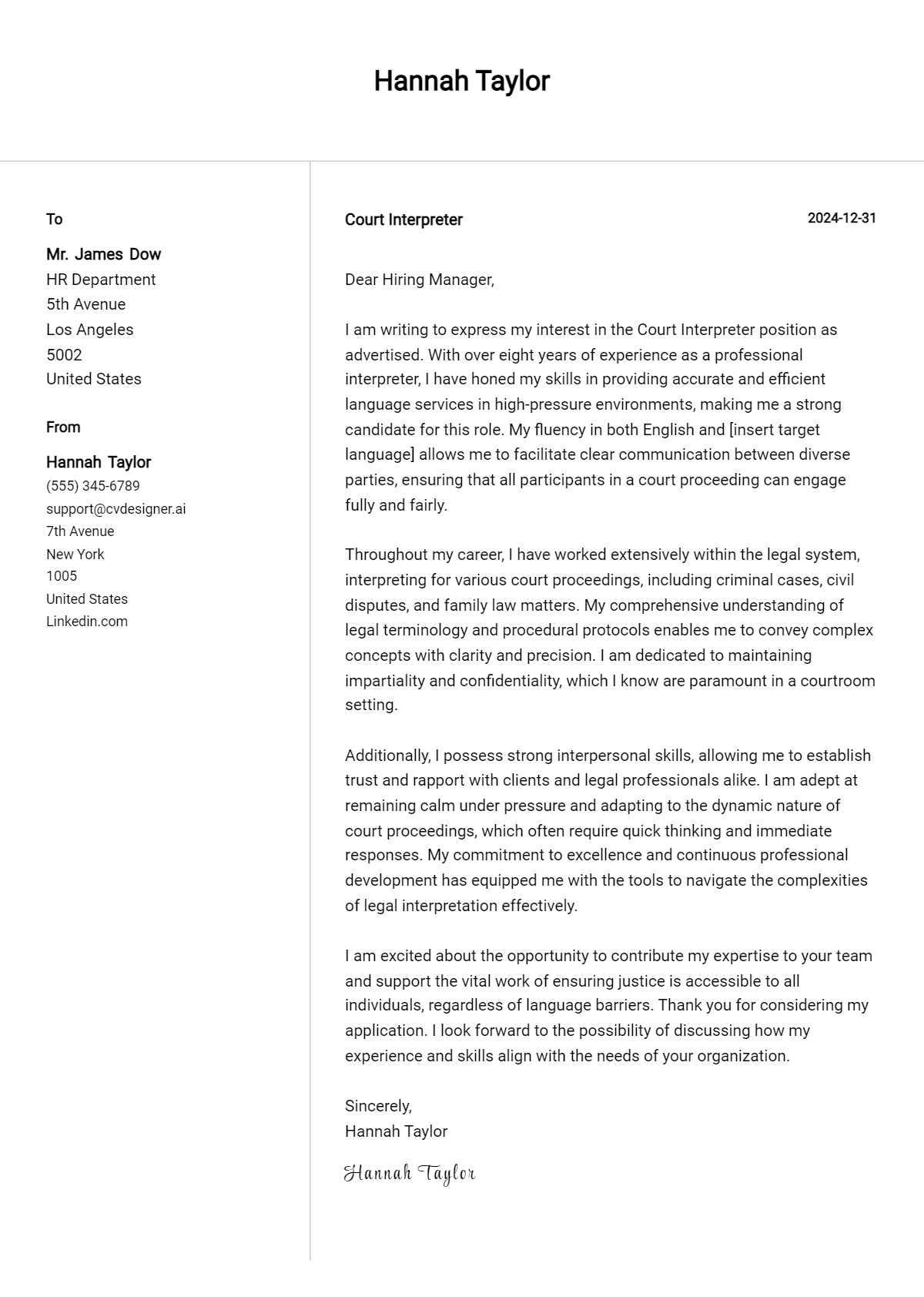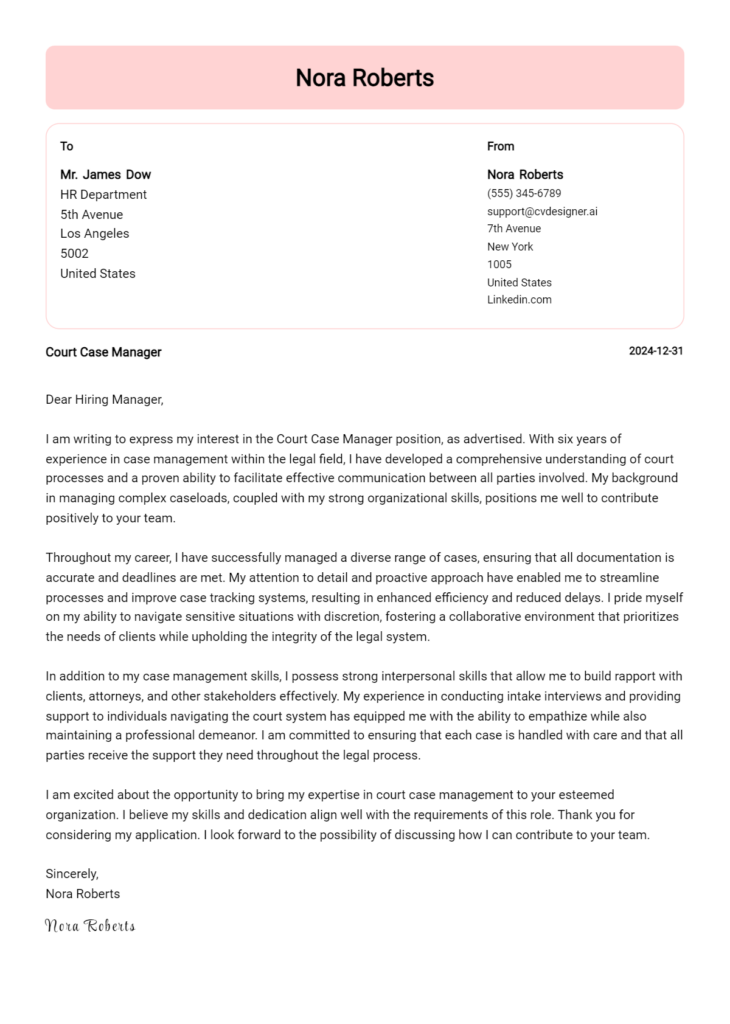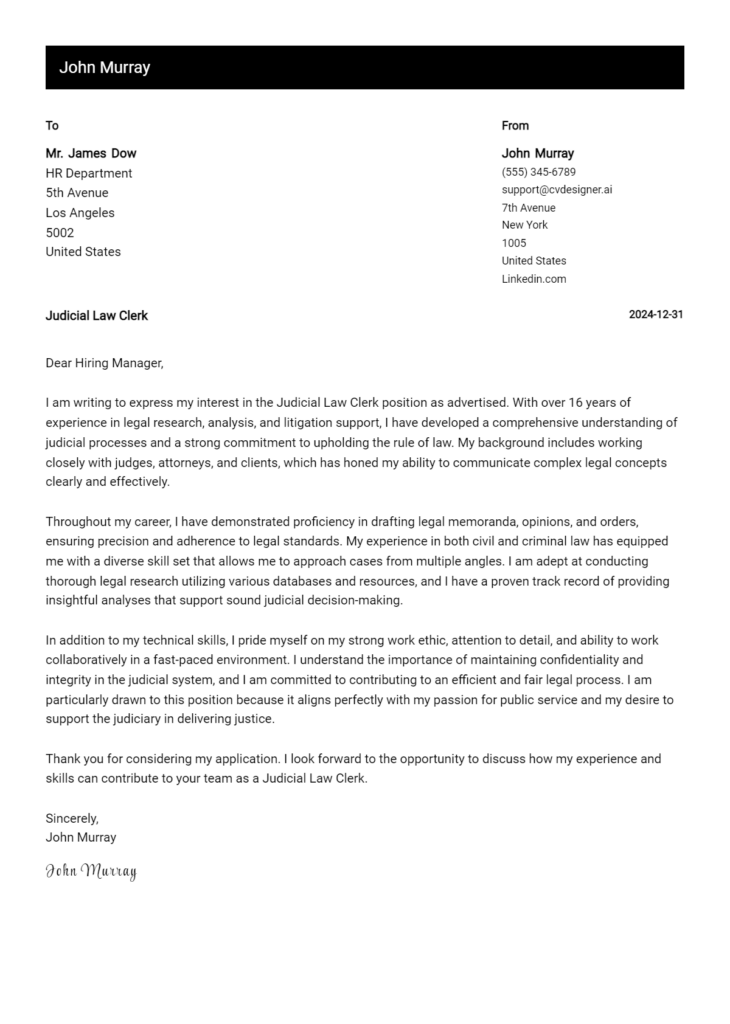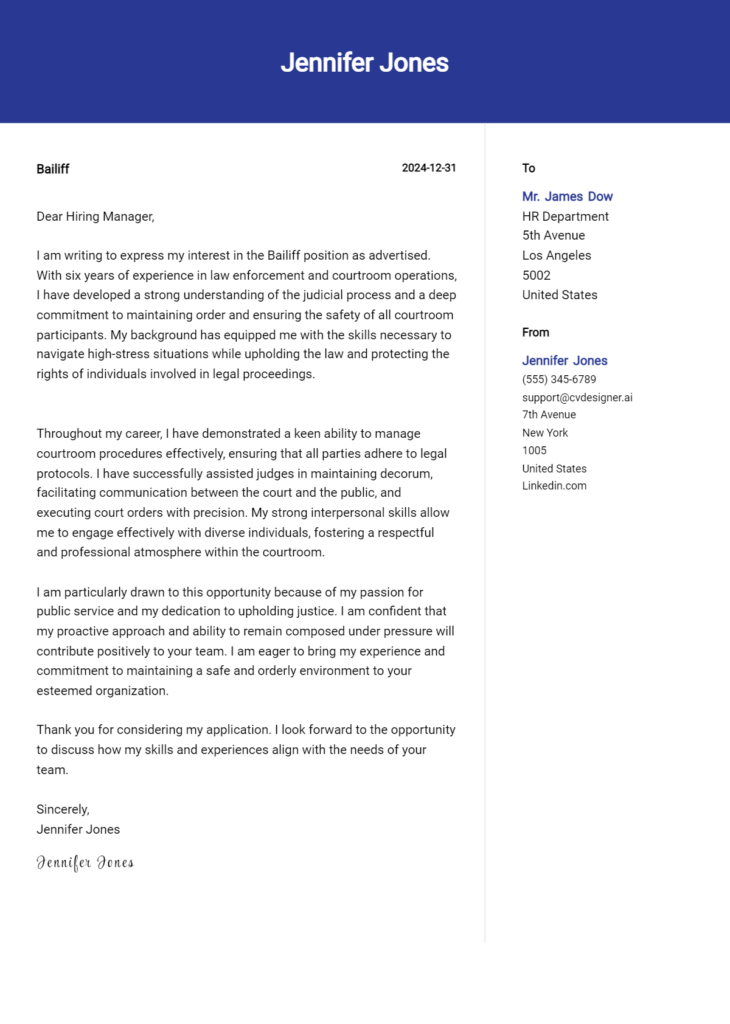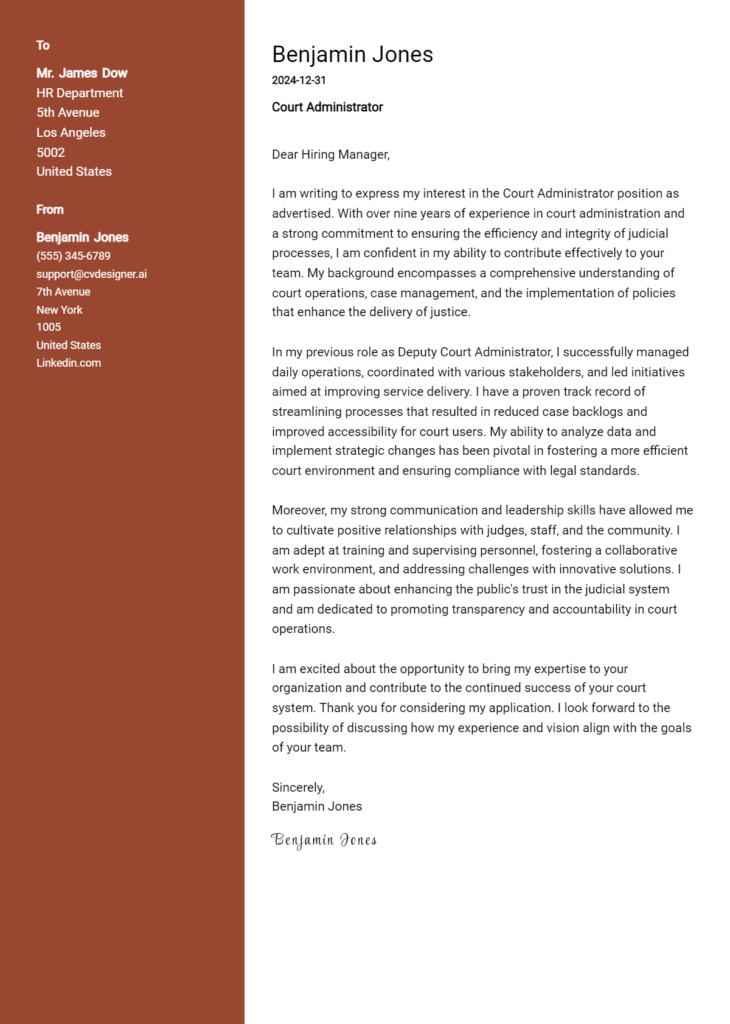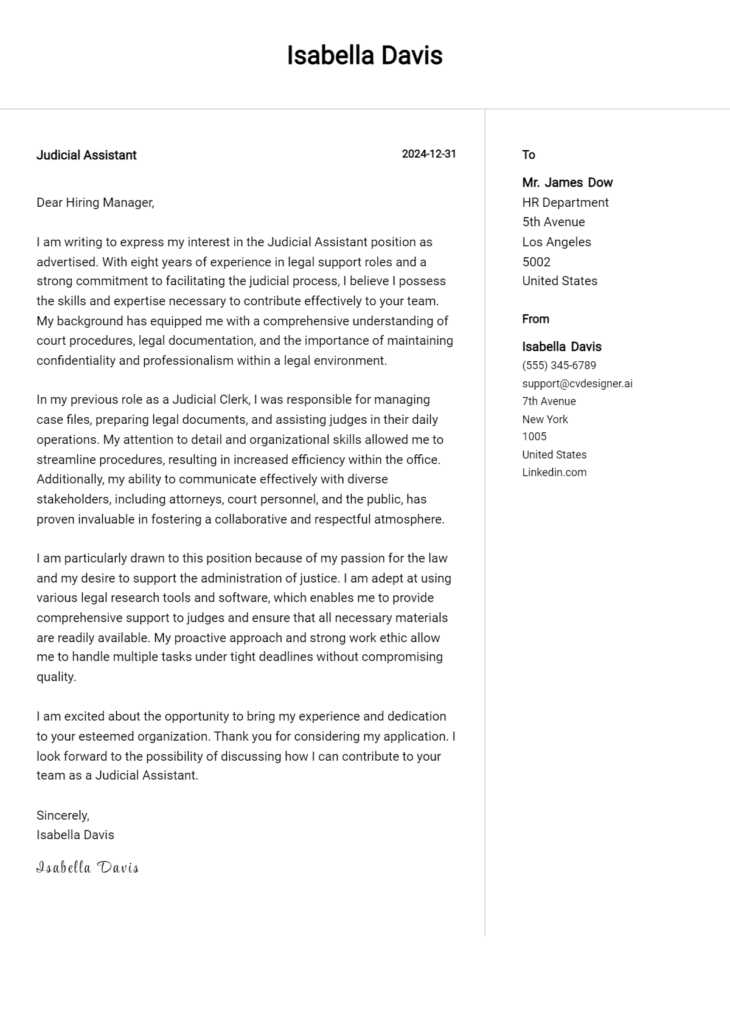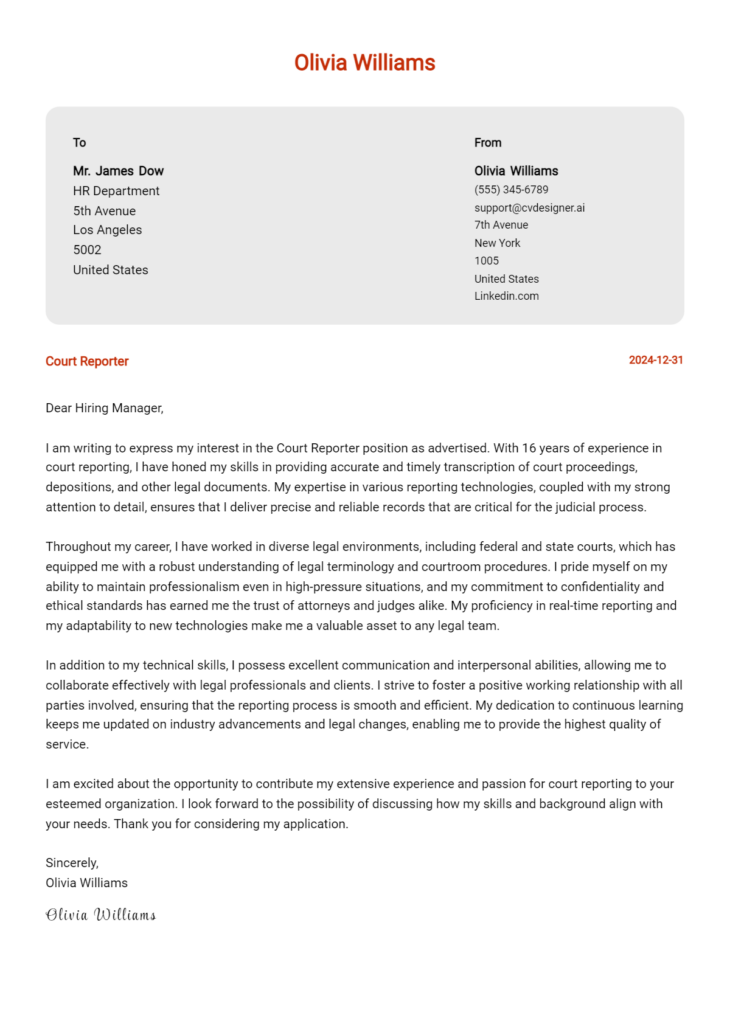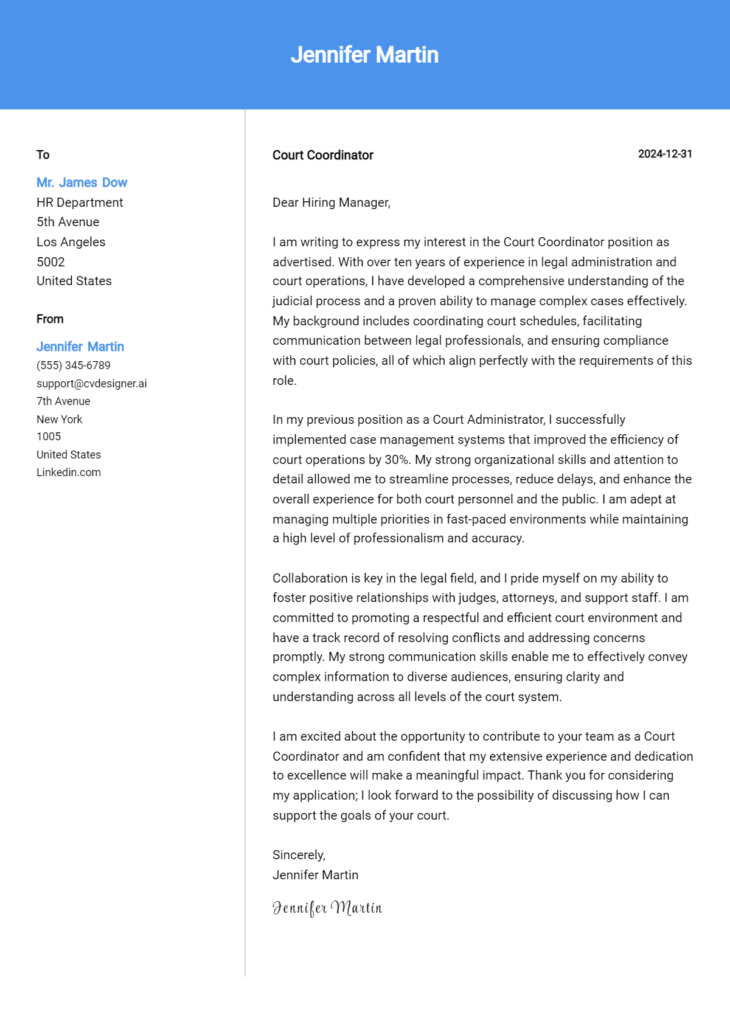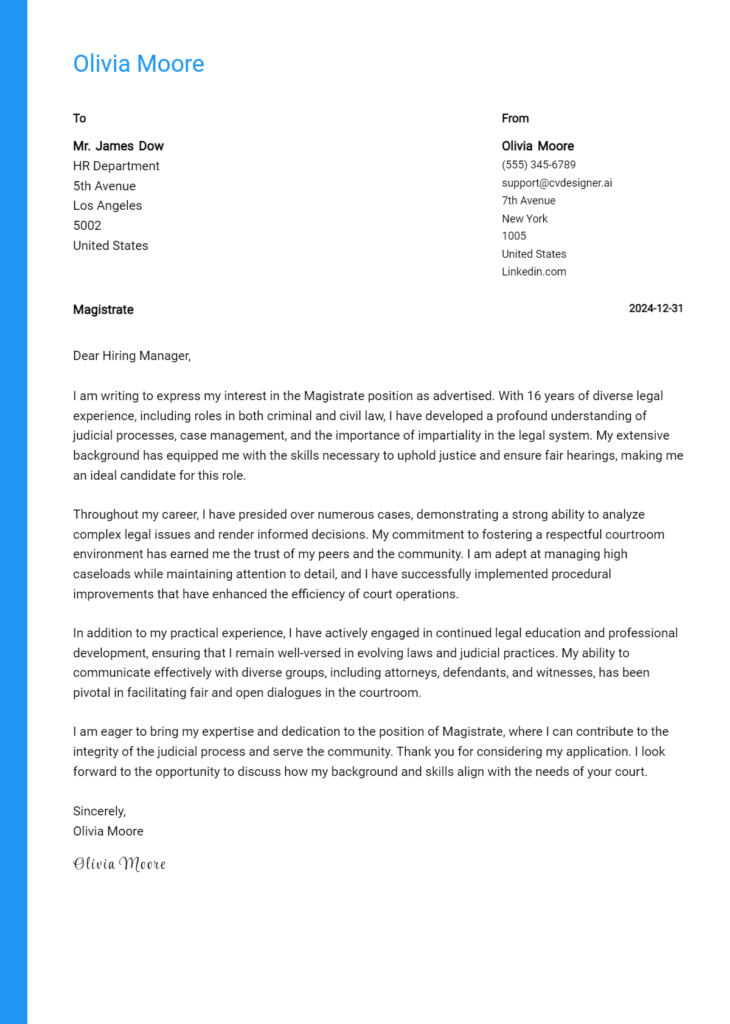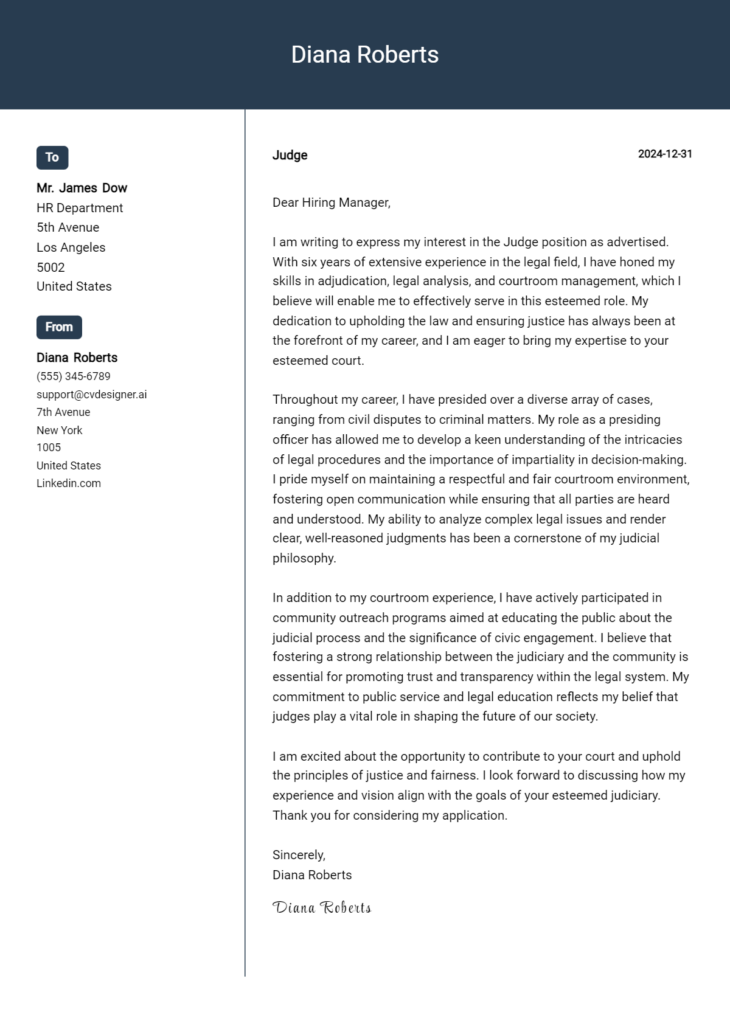Court Interpreter Cover Letter Examples
Explore additional Court Interpreter cover letter samples and guides and see what works for your level of experience or role.
How to Format a Court Interpreter Cover Letter
Crafting a well-structured cover letter is essential for a Court Interpreter, as it serves as your first impression to potential employers. The clarity and organization of your cover letter reflect your linguistic proficiency and attention to detail—traits that are paramount in the field of interpretation. A polished cover letter not only showcases your qualifications but also demonstrates your ability to communicate effectively, a key skill for any Court Interpreter.
In this guide, we'll explore how to format your cover letter to make a strong impact, focusing on the vital components that will help you stand out in a competitive job market.
We'll cover the essential elements of a professional cover letter, including:
- Cover Letter Header
- Cover Letter Greeting
- Cover Letter Introduction
- Cover Letter Body
- Cover Letter Closing
Each section plays an important role in presenting your qualifications and professionalism. Let’s delve into each part and learn how to create a compelling cover letter for a Court Interpreter position.
The Importance of the Cover Letter Header for a Court Interpreter
A well-structured cover letter header is essential for a Court Interpreter as it sets the tone for professionalism and clarity. The header should include your contact information, the date, and the recipient's details in a clear format. This information not only establishes your identity but also provides the recipient with easy access to contact details, ensuring effective communication. A strong header reflects your attention to detail and commitment to the role, while a poorly formatted header can diminish the impact of your application.
Strong Example
Jessica A. Martinez 123 Language Lane Cityville, ST 12345 jessica.martinez@email.com (555) 123-4567 October 5, 2023 Mr. John Doe Court Administrator Cityville Courthouse 456 Justice Ave Cityville, ST 12345
Weak Example
jessica martinez email: jessica.martinez@email.com 555-123-4567 10/5/23 john doe court admin cityville courthouse
The Importance of a Cover Letter Greeting for a Court Interpreter
The greeting of your cover letter serves as the initial point of contact with a potential employer and sets the tone for the rest of your application. A well-crafted greeting demonstrates professionalism and shows that you value the opportunity to communicate directly with the hiring manager. Personalizing your greeting by addressing the hiring manager by name can create a more engaging and respectful impression, indicating that you have taken the time to research the organization. Avoiding generic greetings, such as "To Whom It May Concern," can ensure that your letter feels tailored and thoughtful. If you're unsure of the recipient's name, consider checking the organization's website or LinkedIn page to find the appropriate contact.
Strong Greeting Example
Dear Ms. Johnson,
Weak Greeting Example
To Whom It May Concern,
The Importance of a Well-Crafted Cover Letter Introduction for a Court Interpreter
A well-crafted cover letter introduction is essential for a Court Interpreter, as it sets the tone for the entire application and provides a first impression to the hiring manager. This introduction should not only capture the reader's attention but also convey the candidate's genuine interest in the role. Furthermore, it should briefly highlight key skills or achievements that align with the job requirements, showcasing the candidate's qualifications effectively. A strong introduction can differentiate a candidate in a competitive job market, while a weak one may result in the application being overlooked.
Strong Example
Dear [Hiring Manager's Name], As a dedicated bilingual professional with over five years of experience in legal interpreting, I am excited to apply for the Court Interpreter position at [Company Name]. My passion for ensuring equal access to justice has driven me to excel in high-pressure environments, where I have successfully facilitated communication between non-English speaking defendants and legal professionals. My commitment to accuracy, cultural sensitivity, and legal terminology has earned me recognition from both peers and supervisors, making me a strong candidate for this role.
Weak Example
Dear [Hiring Manager's Name], I am writing to apply for the Court Interpreter position at [Company Name]. I think I would be a good fit because I have some experience in interpreting. I hope to contribute to your team, as I have always liked languages.
Purpose of the Cover Letter Body for a Court Interpreter
The body of a cover letter for a Court Interpreter serves as a critical component that allows candidates to demonstrate their linguistic proficiency, cultural awareness, and legal knowledge. This section is an opportunity to showcase specific skills and experiences that align with the demands of the role, such as successful interpretation in high-stakes legal settings, familiarity with legal terminology, and the ability to maintain impartiality. By highlighting relevant projects or accomplishments, candidates can effectively convey their value to the organization, illustrating how their background and expertise can contribute to the court's mission of fair and just legal proceedings.
Strong Example
I am excited to apply for the Court Interpreter position, as my extensive background in legal interpretation positions me as a strong candidate. In my previous role at the XYZ County Courthouse, I successfully interpreted for over 100 cases, including complex criminal trials and family court hearings. One of my notable accomplishments was assisting in a high-profile immigration case where my accurate interpretation directly contributed to the defendant's understanding of the charges against them, ensuring their rights were upheld. My ability to remain neutral and professional under pressure, coupled with my fluency in both Spanish and English, enables me to facilitate clear communication between the court and non-English speaking parties effectively.
Weak Example
I want to apply for the Court Interpreter job. I have done some interpreting before, and I think I can do it well. I like helping people understand things. I worked at a small law firm once, but I don’t remember much about the cases. I can speak Spanish, but I don’t have any special training. I hope to be a good interpreter and help everyone.
Importance of a Cover Letter Closing for a Court Interpreter
The closing paragraph of a cover letter for a Court Interpreter is crucial for summarizing your qualifications, reiterating your enthusiasm for the position, and encouraging the hiring manager to take the next steps, such as reviewing your resume or scheduling an interview. A strong closing can leave a lasting impression, ensuring that your application stands out. Below are examples of both strong and weak closing paragraphs.
Strong Example
I am excited about the opportunity to contribute my skills as a Court Interpreter with your esteemed court. My extensive experience in legal interpreting and my commitment to ensuring accurate and impartial communication will enable me to serve your clientele effectively. I look forward to the possibility of discussing my application further and am eager to bring my expertise to your team. Please feel free to review my resume, and I hope to schedule an interview at your earliest convenience. Thank you for considering my application.
Weak Example
I think I would be a good interpreter for your court. I have done some interpreting before and I am available for an interview. You can look at my resume if you want. Thanks for your time.
These tips will assist candidates in crafting an effective cover letter for the role of a Court Interpreter. A well-written cover letter should not only highlight your technical skills and problem-solving abilities but also demonstrate your understanding of the Software Development Life Cycle (SDLC), your ability to work in a team, and your commitment to continuous learning. By showcasing these attributes, you can make a strong impression on potential employers.
Tips for Writing a Court Interpreter Cover Letter
Highlight Technical Skills
Emphasize your proficiency in various languages and interpreting techniques. Include specific examples of your experience with legal terminology and courtroom procedures. Employers look for interpreters who can navigate complex legal discussions with ease, so ensuring your technical skills are front and center is essential.Demonstrate Problem-Solving Abilities
Provide examples of situations where you successfully resolved communication barriers in a court setting. Discuss how you handled challenging scenarios, such as conflicting interpretations or high-pressure environments. This not only showcases your skills but also your ability to think on your feet.Showcase SDLC Knowledge
If applicable, mention your understanding of the Software Development Life Cycle (SDLC) in relation to technology used in court settings. This could include familiarity with transcription software, case management systems, or video conferencing tools. Highlighting this knowledge can differentiate you from other candidates.Emphasize Teamwork Skills
Court interpreters often work alongside judges, attorneys, and other court personnel. Illustrate your ability to collaborate effectively with diverse teams. Share examples of how you've contributed to a harmonious and efficient courtroom environment through effective communication and mutual respect.Express a Passion for Continuous Learning
The legal field is ever-evolving, and continuous education is crucial. Mention any relevant training, workshops, or certifications you have pursued to enhance your skills. Express your enthusiasm for staying updated with the latest legal and linguistic developments, demonstrating your commitment to professional growth.
For additional resources, consider exploring cover letter templates and utilizing a cover letter builder to help streamline your writing process.
Common Mistakes to Avoid in a Court Interpreter Cover Letter
Avoiding common mistakes in your cover letter is crucial for standing out as a candidate for a Court Interpreter position. Many applicants make errors that can detract from their qualifications or professionalism. Here are some common mistakes to watch out for:
Generic Salutations: Using “To Whom It May Concern” can make your letter feel impersonal. Always try to find the hiring manager's name for a personalized touch.
Lack of Specificity: Failing to mention the specific court or the nature of the interpreting work can make your application seem unfocused. Tailor your letter to each position, highlighting relevant experiences.
Overly Long or Short Letters: A cover letter that is too long may lose the reader’s attention, while a very short letter might seem unenthusiastic. Aim for a concise yet comprehensive format; refer to this cover letter format for guidance.
Ignoring Formatting Standards: Neglecting proper formatting can make your letter hard to read. Use a clean layout that follows standard business letter conventions, which you can find in various cover letter examples.
Spelling and Grammar Errors: Mistakes in your cover letter can undermine your credibility. Always proofread your letter carefully and consider asking someone else to review it.
Not Highlighting Relevant Skills: Failing to mention specific interpreting skills or certifications can weaken your application. Make sure to emphasize your language proficiency and courtroom experience.
Lack of Enthusiasm: A cover letter that reads like a chore can be off-putting. Show your passion for the role and the importance of accurate interpretation in the justice system.
By steering clear of these pitfalls, you can create a compelling cover letter that effectively showcases your qualifications and enthusiasm for the Court Interpreter role.
Cover Letter FAQs for Court Interpreter
What should I include in my cover letter as a Court Interpreter?
In your cover letter, you should include your relevant qualifications, experience, and language proficiency. Start with a strong introduction that states your intent to apply for the Court Interpreter position. Highlight your educational background, such as any certifications in interpretation or linguistics. Emphasize your experience in legal settings and your familiarity with legal terminology. Mention any specialized training you’ve completed, like ethical considerations in interpretation. Finally, express your passion for facilitating communication within the judicial system and your commitment to accuracy and impartiality.
How can I demonstrate my language skills in my cover letter?
To demonstrate your language skills, include specific examples of your proficiency in the languages you interpret. You can mention certifications, such as passing a state or national interpreter examination. Discuss any relevant experience, like interpreting in courtrooms, depositions, or legal consultations. If applicable, highlight your ability to interpret complex legal jargon or your experience working with diverse populations. Consider mentioning any continuing education or workshops you've attended to enhance your skills. This not only showcases your language abilities but also your dedication to professional growth.
Should I address my cover letter to a specific person?
Yes, addressing your cover letter to a specific person is highly recommended. If possible, research the hiring manager's name or the head of the court's language services department. This shows initiative and personalizes your application. If you cannot find a name, using "Hiring Committee" or "Human Resources" is acceptable, but it’s best to avoid generic salutations like "To Whom It May Concern." A personalized greeting can make your application stand out and create a more engaging introduction to your qualifications and enthusiasm for the Court Interpreter position.
How can I make my cover letter stand out?
To make your cover letter stand out, focus on showcasing your unique qualifications and experiences. Use engaging language and a professional tone while being concise. Tailor your content to reflect the specific requirements of the job description, demonstrating how your skills align with the needs of the court. Include quantifiable achievements, such as the number of cases you’ve interpreted or feedback from attorneys or judges. Additionally, share a brief story that illustrates your commitment to accuracy and impartiality in interpretation. Finally, express your enthusiasm for the role and the impact you hope to make in the judicial system.
Build your Cover Letter in minutes
Use an AI-powered cover letter builder and have your letter done in 5 minutes. Just select your template and our software will guide you through the process.

